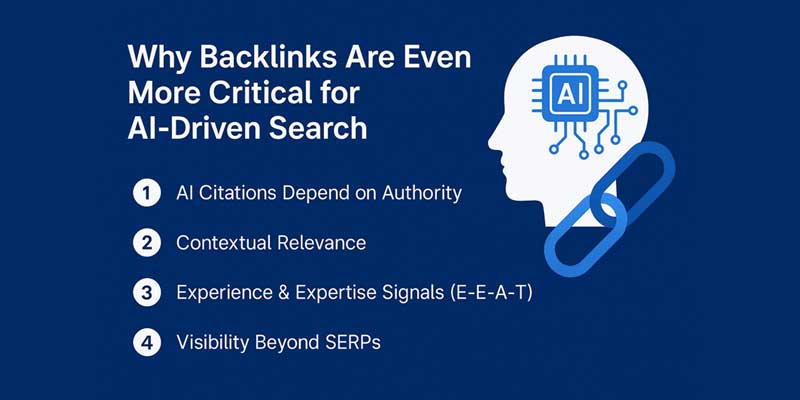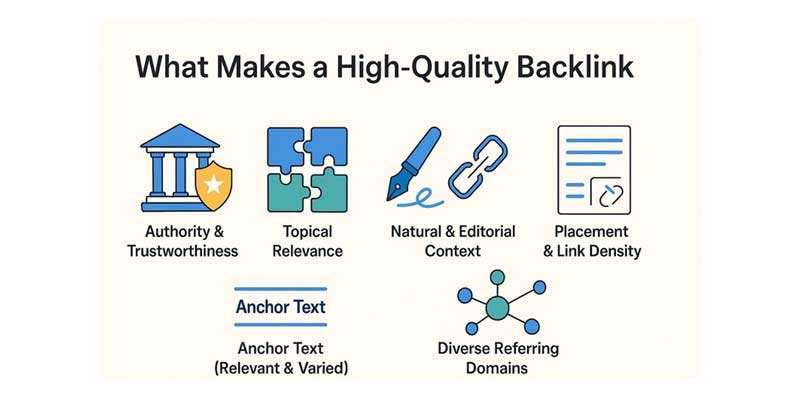

If you’re serious about growing your online presence, one term you’ll hear repeatedly is- backlinks. Understanding the importance of backlinks and knowing how to build backlinks for websites can make all the difference in your search engine rankings. Whether you’re a blogger or a small business, backlinks are essential to improving visibility, authority, and traffic.
A backlink is just a connection between two sites. Linking another website to yours, basically votes your content as worthy. Not all backlinks are equal, though. The power of backlinks is that they can serve as votes of trust and relevance to search engines such as Google.
A robust backlink profile, that is, a varied quality set of backlinks, can significantly improve your website's search engine ranking. Backlinks allow search engines to index your site more efficiently and connect your content to targeted keywords.
Let's get into more detail about the importance of backlinks and delve into how to create backlinks for website authority and developmen
Backlinks have been a core part of SEO for more than two decades, and even with Google’s AI-driven updates, they remain one of the most important signals of credibility and authority. In simple terms, backlinks act like votes of trust—when a respected website links to your content, it’s telling both users and search engines that your page is valuable.
What has changed in 2025 is not the importance of backlinks, but the quality standards. Search engines and AI assistants are no longer impressed by bulk directory links or link exchanges. Instead, they evaluate context, relevance, and the authenticity of the connection. This means businesses need to think of backlinks less as a technical trick and more as a reputation-building tool.
When done right, backlinks aren’t just about rankings—they create a sustainable cycle of visibility, authority, and trust.
AI-powered search results, especially after Google’s July 2025 AI Mode update, rely on summarizing the most authoritative and credible information. This is where backlinks become non-negotiable:

In short: backlinks are no longer just about helping Google’s crawler find you—they now influence whether AI search assistants recommend you.
Not all backlinks are created equal. In fact, a single high-quality backlink can often be more valuable than hundreds of weak ones. Search engines and AI systems now look beyond the existence of a link—they evaluate its source, context, and authenticity. This means the focus must shift from simply acquiring backlinks to earning the right kind of backlinks that truly build authority.

Back in the early days of SEO, backlinks were mostly about numbers. But in 2025, search engines and AI overviews prioritize contextual and experiential signals.
In other words, high-quality backlinks are no longer just technical SEO assets—they’re digital endorsements of relevance, authority, and real-world expertise.
High-quality backlinks aren’t built overnight—they’re earned through consistent effort, originality, and genuine value creation. Below are proven strategies that align with today’s E-E-A-T principles (Experience, Expertise, Authoritativeness, and Trustworthiness) and help secure backlinks that AI-driven search respects.
Search engines and AI systems prioritize fresh insights. Publishing original research, surveys, or data-backed studies instantly makes your content more link-worthy. Similarly, case studies or unique perspectives from your direct experience add credibility that generic content cannot match. Other websites naturally cite these resources because they provide authoritative information unavailable elsewhere.
Collaboration is one of the fastest ways to earn strong backlinks. By forming content partnerships with industry peers, co-authoring articles, or contributing insights to expert round-ups, you position yourself as a thought leader. Outreach to journalists, bloggers, and influencers with valuable commentary ensures your expertise is recognized and referenced.
Contact site owners within your space and provide the opportunity to contribute a guest post. This both earns you good quality backlinks and allows you to demonstrate expertise. Sites like gomediashark.com and lucatagliaferro.com frequently welcome guest work.
Digital PR goes beyond traditional link building by focusing on media mentions, press coverage, and editorial backlinks. Whether through a product launch, expert commentary, or participation in trending conversations, appearing in respected news outlets and industry magazines builds credibility and attracts links from domains with high authority.
For businesses with a regional presence, local citations and business listings remain crucial. Adding your brand to Google Business Profile, Yelp, industry-specific directories, and regional chambers of commerce not only strengthens your local SEO but also provides consistent, trustworthy backlinks. These citations serve as digital proof of legitimacy in your geographic market.
Many authoritative websites maintain resource pages or curated lists of helpful tools, guides, or articles. By creating evergreen, highly practical content—such as checklists, templates, or ultimate guides—you can pitch your resource for inclusion. Similarly, participating in industry round-ups provides visibility and backlinks from curated content hubs.
Websites frequently have outdated or broken links. By identifying these opportunities and suggesting your relevant, high-quality content as a replacement, you provide value to the site owner while earning a backlink. Additionally, monitor your brand mentions—if someone references your business without linking, reach out and reclaim that link.
Building backlinks doesn’t always require a large budget. With the right approach, you can earn high-quality links using free, value-driven strategies. Below are 10 proven methods that consistently deliver results without financial investment.
Help a Reporter Out (HARO) and similar platforms connect journalists with industry experts. By answering relevant queries with thoughtful insights, you can get quoted in news outlets, blogs, and online magazines, often with a backlink to your site. This not only boosts authority but also builds trust with audiences.
Many industry blogs and online publications accept contributor articles. By pitching strong, insightful pieces, you can showcase expertise while earning contextual backlinks. Unlike guest posting at scale, this focuses on quality editorial platforms that have engaged readerships.
The Skyscraper technique involves finding top-performing content in your niche and creating a more comprehensive, updated, and valuable version. Then, reach out to sites linking to the older content and suggest your improved resource. With research and creativity, this can be done effectively without expensive SEO tools.
Strong content naturally gets cited if it gains traction. By promoting your content strategically on social media, industry groups, and professional communities, you increase the chances of others referencing—and linking to—your resource in their own articles.
Simple outreach still works. If your content genuinely complements another site’s resource, politely request a link. Avoid link swaps or paid deals; instead, highlight the mutual value of your content to their audience. This authentic approach often yields lasting backlinks.
Engaging in forums (like Reddit, Quora, or niche communities) and leaving meaningful comments can generate exposure and natural backlinks. The key is to add genuine value, not spam. Over time, these interactions position you as a trusted voice in your field.
Aggregator platforms like AllTop, Medium, or niche-specific content hubs allow you to republish or share valuable resources. When done with care, these can create backlinks while introducing your content to broader audiences.
Forming partnerships with local businesses, organizations, or events often leads to backlinks from their websites. For example, sponsoring a local event or collaborating on a guide can earn mentions on trusted community platforms.
Websites often publish “Top 10” or “Best of” lists. By creating content or tools that stand out, you can pitch editors to feature your business in curated round-ups. These backlinks usually come from relevant, authority-building sources.
| Step | Action | Why It Matters in AI-Mode |
| 1. Define Your Core Backlink Goals | Clarify whether you want to build authority, rank for keywords, or strengthen local SEO. | Ensures every backlink serves a measurable purpose instead of chasing random links. |
| 2. Research Target Sites and Topics (Semantic Relevance) | Focus on websites and content that align with your niche and audience. | AI prioritizes backlinks that are contextually relevant, not generic. |
| 3. Craft Personalized Outreach with Clear Value | Tailor pitches to show how your content benefits their readers. | Builds trust and boosts chances of earning natural, lasting links. |
| 4. Use Schema, TL;DR, and Author Credentials | Implement FAQ/Article schema, add TL;DR summaries, and display expert bios. | Makes your content easy for AI to parse and cite in overviews. |
| 5. Monitor Backlinks and Audit AI-Mode Visibility | Track links in tools like Search Console or Ahrefs and check AI snippet presence. | Ensures your backlinks translate into real visibility and influence in AI search. |
The significance of backlinks to SEO cannot be overemphasized. They're a stamp of authority, trust, and relevance. How to create backlinks for website development is an essential skill for anyone who wants to take their digital presence seriously.
Whether you are starting from scratch or collaborating with an experienced SEO agency in Bangalore, using these 10 strategies will assist you in acquiring more quality backlinks, enhancing your ranking on the search engines, and ultimately achieving more targeted traffic for your site.
Keep in mind that the secret to successful link building is being consistent, creative, and committed to creating quality content. Emphasize value, be strategic, and always prioritize relevance.